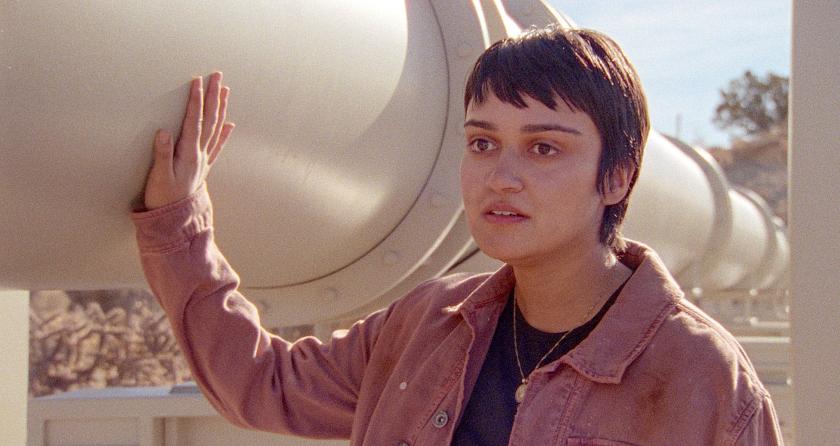“This was an act of self defence,” is the last message we hear as How To Blow Up a Pipeline approaches the end of its 104-minute span. The speaker, a revolutionary environmental activist called Xochitl, has been arrested for her involvement in the demolition of oil pipelines in Texas, but in her view her arrest and the media frenzy surrounding it is all grist to her mill of shaking the world out of its climate-crisis apathy.
Based on the book of the same name by Swedish academic Andreas Malm and directed by Daniel Goldhaber, How To Blow Up a Pipeline offers various instructive pieces of information on its subject (ammonium nitrate is a handy ingredient in making explosives, for instance, while it’s good to know that nitric acid, an ingredient of TNT, can be concocted from tree stump remover and drain cleaner). Malm’s thesis is that decades of peaceful protests and demonstrations have failed to halt the march of fossil fuels, and thus switching to violence and property destruction is the only way radical change can be brought about. And he doesn’t mean glueing yourself to the M25 or throwing powder paint over snooker tables.
All this makes for an absorbing and thriller-like ride as the story’s motley band of disruptors plan and execute their attack on the Texas oil industry, aiming to cause financial chaos as the oil price spikes, though if you’re not yet convinced of the need for the citizenry to get tooled up for combustible guerrilla warfare, the film probably won’t change your mind. I haven’t read Malm’s book, but the way the protagonists are presented in the film offers some nuances in the way we’re invited to respond to their actions.
 For instance Theo (Sasha Lane) is suffering from chronic myeloid leukaemia, possibly caused by pollution from an oil refinery or chemical plant, so she’s aiming to take some revenge in whatever time she’s got left. Xochitl (Ariela Barer, also one of the screenwriters) is haunted by memories of her mother’s death, which she blames on a heatwave caused by climate change, while bomb-maker Michael (Forrest Goodluck, pictured above) wears an expression of perpetual fury and clashes with everyone from his mother to innocent bystanders.
For instance Theo (Sasha Lane) is suffering from chronic myeloid leukaemia, possibly caused by pollution from an oil refinery or chemical plant, so she’s aiming to take some revenge in whatever time she’s got left. Xochitl (Ariela Barer, also one of the screenwriters) is haunted by memories of her mother’s death, which she blames on a heatwave caused by climate change, while bomb-maker Michael (Forrest Goodluck, pictured above) wears an expression of perpetual fury and clashes with everyone from his mother to innocent bystanders.
Perhaps the most relatable of them is Dwayne (Jake Weary), an angry white guy and native Texan who’s burning with rage at the way he has been forced off his own property by the government to allow more oil drilling. In debt and with his wife stricken with chronic anxiety, he’s aiming to get his point across in the most emphatic way possible, and has made a detailed study of the pipelines and the most effective ways to destroy them. It’s hard not to have some sympathy with him, though overall you’re left with the impression that each of the eco-saboteurs is chiefly motivated by their personal concerns and problems rather than a crusading vision of the greater good of mankind. A cynic might say that they’re trying to have their cake and eat it, creating performative mayhem while wrapping themselves in eco-righteousness.
It’s only Theo’s lover Alisha (Jayme Lawson) who gets to articulate a mainstream, anti-violence viewpoint, even if it does sound as if it was written in to provide a token alternative view. “This flashy shit is pure ego,” she tells Xochitl. “Ok so you scare some oil companies, but you’re really going to fuck over poor people.”
Plenty of food for thought anyway, and the film could hardly be more timely.















Add comment